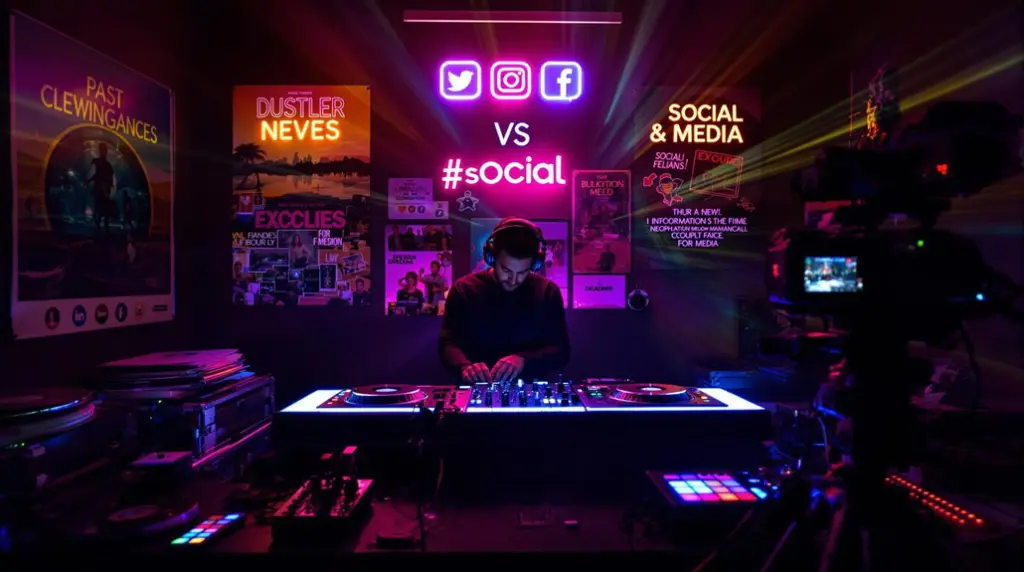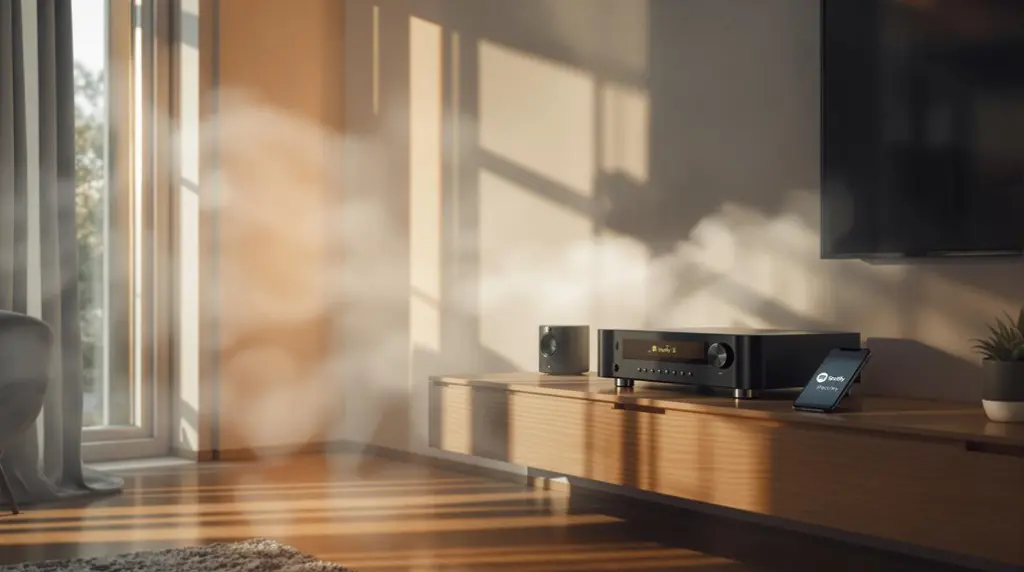Starting a DJ business involves several key steps. Begin by defining your target audience and choosing specific DJ services that resonate with their needs, such as tailored wedding playlists or corporate event music. Legally establish your business with appropriate registrations and structure. Conduct in-depth competitor analysis to identify service gaps and pricing strategies. Acquire essential DJ equipment, ensuring high-quality components for peak performance. Develop a strong brand and cohesive online presence through a professional website and active social media engagement. Building a loyal client base through effective engagement strategies is vital for sustained growth. There is more to explore on this thrilling journey.
Key Takeaways
- Identify your target audience and tailor your DJ services to meet their specific needs and preferences.
- Establish a legal business foundation by registering your business and obtaining necessary permits and tax identification.
- Research local competitors to set competitive pricing and identify market opportunities for differentiation.
- Invest in essential DJ equipment, including a DJ controller, speakers, and a robust PA system, to ensure professional performance.
- Develop a strong online presence with a professional website and active social media engagement to attract and connect with clients.
Choose Your DJ Services
Starting on the journey to establish your own DJ business begins with the critical step of selecting the services you will offer. A focused approach to identifying your target audience, such as weddings and corporate events, is essential.
Crafting tailored wedding playlists that resonate with the emotional tone of matrimonial celebrations, or curating a professional yet engaging atmosphere for corporate events, positions your DJ business for success. Consider enhancing your online presence with a professional website showcasing your brand and services to attract potential clients.
Conduct an in-depth analysis of local market demands to determine which services are most frequently requested. This research informs your service offerings, guaranteeing alignment with client needs. To stand out in a competitive market, consider integrating specialized services like bespoke event planning and innovative lighting design, or catering to niche music genres.
Develop a thorough list detailing your offerings, including hours of operation and pricing structures. This strategic clarity facilitates seamless communication with potential clients and streamlines the booking process.
Regular assessment of service performance is crucial. Stay adaptable by incorporating client feedback and monitoring market trends, allowing you to refine or expand your services.
This adaptability not only enhances client satisfaction but also guarantees sustainable business growth.
Register Your DJ Business
With a clear vision of your DJ business services, the next step involves establishing a solid legal foundation for your enterprise. Business registration is vital in guaranteeing your operations are both legitimate and protected. Start by selecting a suitable business structure, such as a sole proprietorship or LLC.
While a sole proprietorship is simpler, an LLC offers liability protection and can enhance your professional credibility. It’s also important to understand copyright and legal obligations related to music tracks, which can help avoid potential legal issues and reinforce your standing in the music industry.
Securing a tax identification number (EIN) from the IRS is important in facilitating business banking and seamless tax reporting. Fortunately, sole proprietors can conveniently apply for an EIN online.
Understanding the legal requirements in your area is imperative, as local regulations can vary. This may involve acquiring necessary permits and licenses, including public performance licenses, which are often mandatory for DJ businesses.
Registering your business name with your state’s Chamber of Commerce is a strategic move to secure your brand identity and guarantee no other entity is using your chosen name.
Consulting with a legal professional is advisable to navigate the complexities of the business registration process. This guarantees full compliance with local, state, and federal laws, safeguarding your DJ business against potential legal challenges.
Research the Competition
To strategically position your DJ business in a competitive landscape, it is essential to conduct a thorough analysis of local competitors, focusing on their unique offerings, pricing structures, and target audiences.
By examining competitors’ branding strategies through their online presence and customer engagement techniques, you can glean valuable insights to differentiate your services effectively.
For instance, consider engaging actively on social media platforms, as this tactic not only helps in connecting with fans but also in understanding market trends and audience preferences.
Further, leveraging tools like SWOT analysis will help identify market gaps and opportunities for your business to offer distinct value propositions that align with current demand.
Local Competitor Analysis
Conducting a thorough local competitor analysis is a vital step in establishing a successful DJ business. Understanding the pricing strategies of local DJs is paramount. Analyze their pricing structures, which typically range from $500 to $1,500, depending on event duration and service offerings. This analysis will help you set competitive yet profitable rates.
It is equally important to identify competitor strengths, such as specific musical genres and services they specialize in, which are essential for differentiating your offerings. Common genres like Top 40, EDM, and wedding classics dominate the market, allowing you to target niche audiences effectively.
Evaluating competitors’ online presence provides valuable insights into market dynamics. Examine their websites and social media engagement, as DJs with active accounts often receive up to 50% more client inquiries. Customer reviews and testimonials further illuminate client priorities, emphasizing professionalism, reliability, and music selection.
Lastly, attending local DJ gigs offers a practical perspective. Observe competitors’ equipment setups and crowd engagement strategies. Also, take note of the promotional materials they use. These observations can help refine your competitive edge, ensuring your DJ business stands out in a crowded market.
Branding Strategy Insights
Regularly conducting a detailed examination of local DJ businesses is essential for crafting a robust branding strategy. By analyzing the branding elements of competitors, such as logos, website design, and social media presence, you can identify successful strategies and pinpoint areas for improvement within your own brand. This evaluation provides insights into how customer perception is shaped and how you might align your brand to meet or exceed these expectations.
A thorough review of competitors’ unique selling points and service offerings helps you to differentiate your own DJ business effectively. Understanding the target audiences of these competitors allows you to tailor your branding strategy to capture potentially unserved or underserved demographics.
Additionally, examining pricing structures and promotional strategies of local DJs equips you with the knowledge to position your services competitively in the market.
Incorporating tools like SWOT analysis enables a systematic assessment of your business’s strengths, weaknesses, opportunities, and threats relative to competitors.
Service Differentiation Tactics
Building on the insights gained from a strategic evaluation of your competitors’ branding efforts, the focus now shifts to service differentiation tactics that can set your DJ business apart in a competitive market. Conducting a thorough analysis of local DJ services is essential. By examining their pricing, service offerings, and target demographics, you can identify market gaps that your unique offerings can fill. Attending competitors’ events or reviewing their online presence provides valuable insights into their strategies.
Utilizing tools like SWOT analysis allows you to assess competitors’ market positioning effectively. Recognizing their strengths and weaknesses enables you to craft a unique value proposition that meets unfulfilled needs. Exploring underrepresented event types, such as corporate events or themed parties, can enhance your market positioning by catering to niche markets.
Gathering customer feedback from competitors helps you understand client pain points, allowing you to tailor services to address those specific needs. This strategic approach not only differentiates your offerings but also guarantees alignment with market demands.
| Aspect | Strategy |
|---|---|
| Competitor Analysis | Identify gaps in pricing and services |
| SWOT Analysis | Highlight strengths and weaknesses |
| Customer Feedback | Address unmet client needs |
This all-encompassing approach guarantees your DJ business offers distinct, competitive value.
Invest in DJ Equipment
Investing in essential DJ equipment is foundational to establishing a professional presence in the industry, with a basic setup costing between $1,500 to $3,000.
Prioritize high-quality components such as a DJ controller, speakers with a minimum of 500W for adequate coverage, and reliable music management software like Serato or Rekordbox.
Additionally, maintaining a dynamic and up-to-date music library through platforms like ZIPDJ is vital for catering to varied audiences and event types.
Essential DJ Gear
Diving into the world of DJing requires careful consideration of essential gear that lays the foundation for successful performances. A well-curated DJ gear setup is essential for delivering seamless and engaging sets. Here are the DJ gear essentials that form the backbone of any performance setup:
1. Core Equipment: Central to your setup is a DJ controller or CDJs, paired with a reliable laptop equipped with industry-standard DJ software such as Serato or Rekordbox.
High-quality headphones are indispensable for precise cueing, while a robust PA system, with a minimum of 500W, guarantees your sound reaches every corner of small to medium-sized venues.
2. Microphones and Setup: Dynamic microphones are important for announcements and audience interaction, enhancing the event’s atmosphere.
A professional DJ booth or stand not only provides a polished aesthetic but facilitates organized equipment access, essential for smooth operations during performances.
3. Backup and Accessories: Having backup systems, like extra laptops or controllers, is a must to prevent disruptions.
Additionally, peripherals such as heavy-duty gaffer tape, flight cases for safe equipment transport, and lighting gear greatly boost the event’s quality and ambiance, guaranteeing a professional presentation.
Music Library Essentials
Curating a diverse music library is a fundamental aspect of a DJ’s toolkit, enabling adaptability to various audiences and events. A robust collection that spans multiple music genres and eras is essential, allowing a DJ to seamlessly shift between different styles and meet the dynamic demands of any occasion.
Investing in access to extensive music libraries such as ZIPDJ or Beatport can provide unlimited downloads and regular updates. This investment guarantees that DJs have a continuous influx of new tracks, keeping them current with popular trends.
Efficient track organization techniques are equally vital for optimizing performance. Utilizing software like Serato or Rekordbox can help DJs create well-structured playlists, facilitating easy navigation during live sets. These platforms allow for tagging, categorizing, and sorting tracks, providing quick access and enhancing the DJ’s ability to cue up the perfect song at the right moment.
Regularly updating the music library by adding new hits and staying attuned to emerging trends guarantees ongoing relevance and appeal to clients. Additionally, maintaining a backup on external drives or cloud storage safeguards against potential data loss, ensuring an uninterrupted performance.
This meticulous approach to music management is indispensable for any aspiring DJ entrepreneur.
Build Your DJ Brand
Building a compelling DJ brand is essential in distinguishing yourself in the competitive music industry and attracting a loyal client base. The journey of branding evolution involves creating a unique identity that resonates with your target audience and fosters sustained audience engagement.
Start by selecting a catchy and memorable DJ name that mirrors your style. Ensuring its uniqueness is critical for immediate market recognition. A distinctive name sets the foundation for your brand’s presence and marketability.
- Design a Professional Logo: Craft a logo that aligns with your brand’s ethos and appeals to your audience. Given that visuals are processed 60,000 times faster than text, a well-designed logo is instrumental in establishing a strong first impression and solidifying brand identity.
- Develop a Cohesive Online Presence: Leverage a user-friendly website alongside consistent branding across all social media platforms. This enhances your visibility and bolsters potential client engagement.
- Utilize High-Quality Content: Showcase your personality through high-quality images and engaging content. This not only boosts credibility but also strengthens your connection with current and prospective clients.
Regularly seek feedback to adapt and refine your brand, ensuring it remains aligned with evolving audience expectations and industry trends.
Compile Your Music Library
A robust music library is the cornerstone of a successful DJ business, serving as the primary tool for delivering memorable performances tailored to diverse audiences.
Music genre diversity is essential for catering to various event types and audiences, guaranteeing you have the right tracks for any occasion. By including a wide array of genres, you can seamlessly adapt your sets to suit weddings, corporate events, club nights, and festivals. Regularly updating your library with new releases and popular hits is fundamental to keeping your performances fresh and appealing.
Track organization techniques play an important role in optimizing your music library for easy access during gigs. Utilizing music management software such as Serato or Rekordbox allows for efficient categorization by genre, tempo, or mood, enabling quick retrieval and smooth changes.
Consider subscribing to extensive music libraries like ZIPDJ, offering unlimited downloads and markedly expanding your music offerings without the need for individual purchases.
Additionally, it is imperative to secure the appropriate licenses for all music used during public performances to avoid legal complications and uphold a professional reputation. Managing these aspects guarantees your DJ business remains competitive and respected in the industry.
Establish an Online Presence
Having a well-organized music library sets the stage for expanding your DJ business into the digital domain, where establishing a robust online presence is essential. A professional website acts as your digital storefront, showcasing your DJ services, biography, event portfolio, and contact information.
Ensuring your site is optimized for search engines is vital to improve visibility and attract potential clients. Website optimization involves using relevant keywords, creating a mobile-friendly interface, and reducing load times to enhance user experience.
Social media engagement is another important component. Platforms like Facebook, Instagram, and TikTok allow you to connect with your audience through regular updates, behind-the-scenes content, and snippets of live performances.
This engagement can be streamlined using tools like Hootsuite, which facilitates automated posting and efficient engagement management, allowing you to stay active without overwhelming your schedule.
To further solidify your online presence, consider adopting a cohesive brand identity. Here’s how:
- Design a memorable logo that reflects your style.
- Maintain consistent messaging across all platforms.
- Host interactive sessions like live streams or Q&As on Twitch or Mixcloud to build a loyal community.
These strategies will enhance your digital presence, establishing your brand in the competitive DJ landscape.
Connect With Clients and Fans
Harnessing the power of direct engagement is essential for any DJ seeking to connect effectively with clients and fans. Implementing robust client engagement strategies is vital for establishing a lasting connection with your audience.
Social media platforms such as Facebook and Instagram serve as dynamic tools for sharing music snippets and event highlights, enabling DJs to reach a wider audience. These platforms allow for the use of fan interaction techniques, such as engaging content and live Q&A sessions, which help personalize the DJ’s brand and foster community loyalty.
A professional website acts as the central hub for client inquiries, showcasing services, past events, and client testimonials to validate your expertise. This digital portfolio is an effective client engagement strategy, simplifying the booking process while reinforcing the DJ’s credibility.
Attending local events provides opportunities for face-to-face interactions, creating personal connections that often translate into future bookings.
Consistent engagement is key; responding to comments and messages strengthens the connection with fans, enhancing brand loyalty. In addition, exclusive promotions or giveaways on social media incentivize current followers to share content, effectively broadening your reach to potential clients.
These strategies collectively enhance both client and fan relationships, driving business growth.
Frequently Asked Questions
How Much Does It Cost to Start up a DJ Business?
Starting a DJ business involves an equipment budget of $1,000 to $10,000 and marketing strategies costing $500 to $3,000. Additional expenses include legal, insurance, and operational costs, leading to an extensive startup budget requirement.
How to Become a DJ Step by Step?
Becoming a DJ involves mastering DJ equipment, curating a diverse music selection, and honing mixing skills. Begin with quality gear, study music theory, practice regularly, and build a professional network to enhance your reputation and secure engagements.
How to Start a DJ Shop?
To start a DJ shop, conduct market analysis on DJ equipment demand, establish supplier relationships, and implement innovative marketing strategies. Focus on creating an engaging retail experience, offering workshops, and fostering community engagement to attract and retain customers.
How to Become a DJ in the UK?
To become a DJ in the UK, invest in essential DJ equipment and familiarize yourself with music licensing requirements. Building a diverse, updated music library and networking within the industry are vital steps for establishing a successful DJ career.
Conclusion
In establishing a DJ business, the outlined steps provide a thorough framework essential for success. Selecting specific DJ services and formalizing the business through registration set a strong foundation. Analyzing competitors and acquiring quality equipment are vital for maintaining a competitive edge. Building a distinct brand and curating an extensive music library enhance market appeal. Establishing an online presence and engaging with clients and fans further solidify the business, ensuring sustainability and growth within the dynamic entertainment industry.




